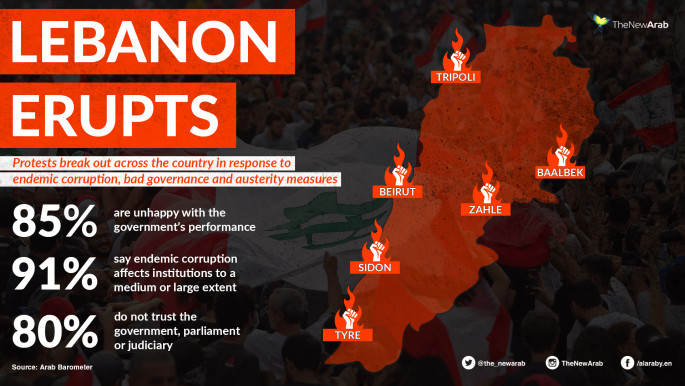From pop stars to pageant queens: These are the celebrities partaking in Lebanon’s protests
From Beirut to Tyre, thousands have flooded the central squares of Lebanon’s cities every day for over a week, and many of the country’s most famous faces have found common cause with the masses.
In a series of tweets, pop singer Elissa was among the first high-profile Lebanese star to express her support for the demonstrations, tweeting: “This is the first time that I wish I was in Lebanon, my heart is with you”.
Read more: Five things you need to know about the protests in Lebanon
Fellow songstress and Arab pop royalty Nancy Ajram tweeted to her 13.8 million followers from Riyadh: “Every moment and every beat of my heart is with my country. We deserve our right to live with dignity. May God protect Lebanon.”
Singer and actress Haifa Wehbe also took to Twitter to show her support to end sectarian divides.
“There is nothing better than the Lebanese people when they stand in unity and under one slogan, without any political affiliation. We are all for our country,” she posted.
Twitter Post
|
Nadine Nassib Njeim, actress and former Miss Lebanon, has been among the crowds since day one of the historic marches, uploading videos of herself protesting to her 9.2 million Instagram followers.
Njeim captioned the post with a heartfelt statement against corruption and sectarianism: “May God protect the Lebanese youth. May He be with you and we stand as one in the face of corruption and parties and slogans and theft. We Lebanese don’t follow any party.”
Twitter Post
|
“We are with you, we went to the streets for Lebanon and we are not with any party,” Njeim concluded.
Renowned pop singer Maya Diab, also made her solidarity known to her 7.5 million Instagram followers, uploading a video of herself standing on top of a car, waving the Lebanese flag with the hashtag #revolution.
| Instagram Post |
Global superstar singer and composer Ragheb Alama was seen on his motorbike in the heart of Beirut chatting to fellow protesters.
Alama also took to Twitter to denounce the corrupt ruling elite and their proposed tax on Whatsapp calls.
“The people’s misfortunes are not funny. Why don’t you tax the polluted air people breathe? It is a great idea that brings money to your fathers’ treasury, too,” he wrote.
'Revolution, revolution'
Sparked on 17 October by a proposed tax on calls made through messaging apps, the protests have morphed into a cross-sectarian street mobilisation against a political system seen as corrupt and broken.
Despite the reversal of the proposed policy and the adoption of an emergency economic plan by Prime Minister Saad Hariri, protesters in the tens of thousands are continuing to take the streets in anger over corruption, unemployment and political stasis.
Over a quarter of Lebanon's population lives below the poverty line, according to the World Bank, while a small circle of corrupt elites use their political connections to grow vast fortunes.
Only in few instances have the protests turned violent, with the majority remaining peaceful, characterised by patriotic chants and anthems, and the brandishing of the Lebanese flag rather than any political or sectarian symbols.
 |
|
| Click to enlarge |
Follow us on Twitter: @The_NewArab

![Trump's warm greeting to Netanyahu contrasted with Kamala Harris's critical reception [Getty]](/sites/default/files/styles/image_330x185/public/2024-07/GettyImages-2162908988.jpg?h=69f2b9d0&itok=OLc5dL88)
![The brutal assault on Khan Younis has killed dozens and displaced thousands more [Getty]](/sites/default/files/styles/image_212x120/public/2024-07/GettyImages-2162526709.jpg?h=d3eda8cf&itok=HCP84AvQ)
![Members of the Algerian delegation threw roses into the Seine [Getty]](/sites/default/files/styles/image_330x185/public/2024-07/GettyImages-2162980872.jpg?h=199d8c1f&itok=h_3o_TOL)